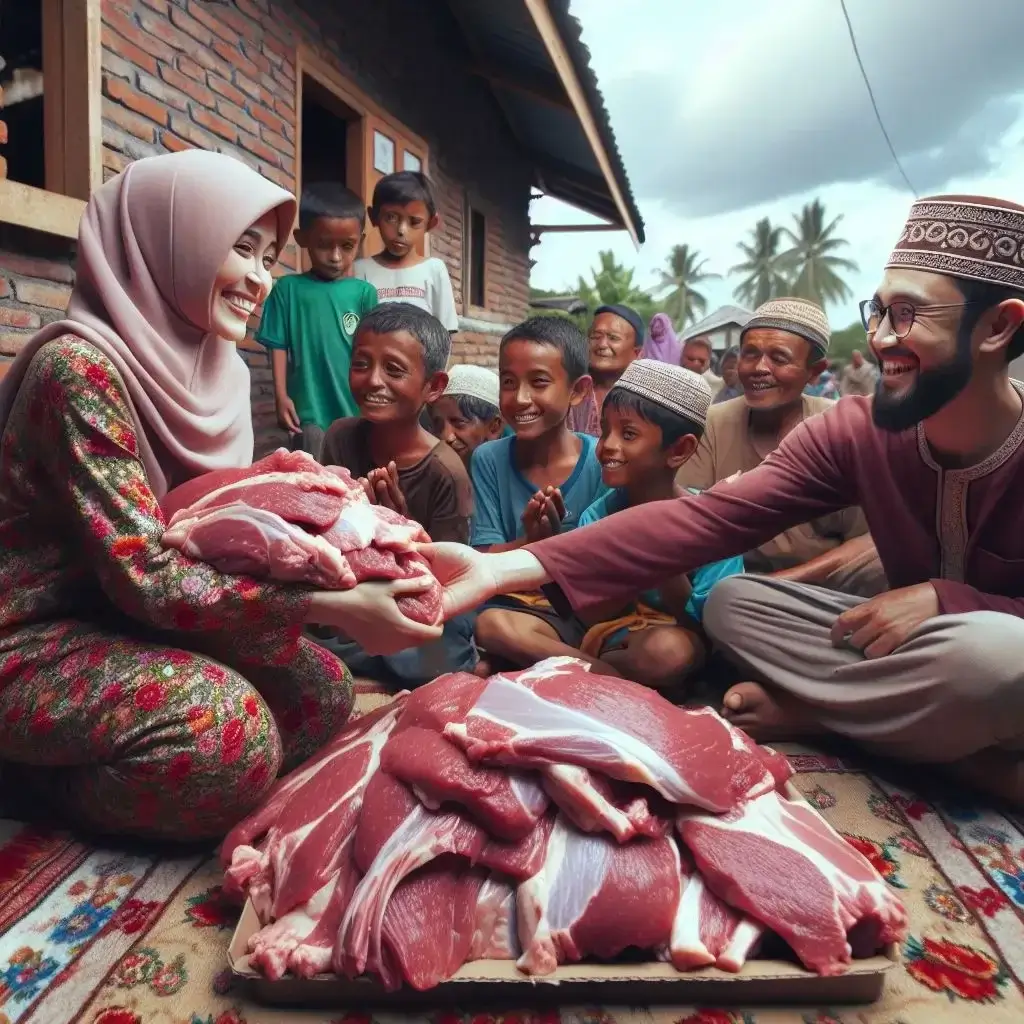Beyond the Sacrifice: Understanding the Spiritual Meaning of Qurbani

In the heart of Islam lies the profound tradition of Qurbani (or Udhiya), a sacred act of sacrifice performed during the auspicious days of Eid al-Adha. But what does Qurbani truly entail? Beyond the physical act of offering an animal, it is a deeply meaningful practice that transcends time, culture, and geography. It is a journey of faith, a testament to unwavering obedience to God, a heartfelt expression of compassion for those in need, and a vibrant celebration of community spirit.
Table of Contents
Join us as we embark on a captivating exploration of Qurbani. We’ll delve into its historical roots, tracing its origins back to the story of Prophet Ibrahim (AS). We’ll uncover the rich symbolism woven into every aspect of this ritual, from the selection of the animal to the distribution of its meat. We’ll journey to different corners of the world, witnessing how Qurbani is observed in diverse cultures, each adding its unique flavor to this universal tradition.
In the modern age, Qurbani continues to hold immense relevance. It is a time for reflection, renewal, and strengthening our bond with the divine. It is an opportunity to extend a helping hand to the less fortunate, fostering a sense of shared humanity. It is a moment to come together as a community, united in faith and purpose.
Whether you are a devout Muslim seeking to deepen your understanding of Qurbani or someone curious about its significance, this exploration will shed light on a practice that has touched the lives of billions across centuries. Let us embark on this journey together, discovering the profound meaning and enduring impact of Qurbani in our lives and the world around us.
The Story Behind the Sacrifice
At the heart of Qurbani lies a timeless story that resonates across generations, a tale of unwavering faith and unyielding obedience. It is the story of Prophet Ibrahim (AS), a man revered for his piety and devotion to God. In a divine test that would challenge the very core of his being, Ibrahim (AS) received a command from Allah (SWT) to sacrifice his beloved son, Ismail (AS).
Imagine the weight of such a decree, the agonizing conflict between paternal love and unwavering faith. Yet, Ibrahim (AS) did not waver. He confided in his son, who, in his youthful innocence and profound understanding of God’s will, readily accepted his fate. With heavy hearts but unwavering resolve, they journeyed together to the designated place of sacrifice.
As Ibrahim (AS) prepared to fulfill the divine command, his unwavering faith was rewarded. Just as he was about to strike, a ram appeared, sent by Allah (SWT) as a substitute for Ismail (AS). The immense relief, gratitude, and awe that washed over Ibrahim (AS) is unimaginable. His unwavering faith had not only spared his son but had also elevated him to the status of a paragon of submission to the divine will.
This poignant story is etched into the annals of Islamic history, serving as a powerful reminder of the following:
- Unwavering Faith: Ibrahim’s (AS) unyielding faith in Allah (SWT), even in the face of extreme hardship, is a testament to the power of trust and surrender.
- Complete Obedience: His willingness to sacrifice his most cherished possession for the sake of Allah (SWT) exemplifies the pinnacle of obedience and devotion.
- Divine Mercy and Compassion: The replacement of Ismail (AS) with a ram highlights Allah’s (SWT) boundless mercy and compassion for His creation.
- The Reward for Righteousness: Ibrahim’s (AS) steadfastness earned him not only the preservation of his son but also an everlasting legacy as a beacon of faith for all Muslims.
The story of Prophet Ibrahim (AS) and Ismail (AS) continues to inspire and guide Muslims worldwide. It teaches us that true faith is not merely a belief but a way of life, one that demands sacrifice, trust, and unwavering devotion to Allah (SWT). It reminds us that even in our darkest moments, divine mercy and guidance are never far away. And it reinforces the profound bond between a parent and child, a bond built on love, sacrifice, and shared faith.
As we celebrate Eid al-Adha and partake in the Qurbani ritual, let us remember the profound lessons from this story. Let us strive to emulate the unwavering faith of Ibrahim (AS), the unwavering obedience of Ismail (AS), and the boundless mercy of Allah (SWT).
Qurbani Around the World: A Beacon of Hope and Unity
Qurbani transcends borders and cultures, reaching far beyond individual acts of devotion to touch the lives of countless individuals and communities worldwide. One of the most profound impacts of Qurbani lies in its role as a powerful tool for combating hunger and providing sustenance to those in need.

Feeding the Hungry: Qurbani’s Nourishing Embrace
A central tenet of Qurbani is the distribution of meat to the poor, needy, and marginalized members of society. This act of sharing reflects the Islamic principle of caring for others and ensuring that no one goes hungry, especially during the festive days of Eid al-Adha.
In many parts of the world, Qurbani meat is a lifeline for families struggling to make ends meet. It provides essential nutrition and offers a respite from the daily challenges of poverty. Through the distribution of meat, Qurbani becomes a tangible expression of compassion, reminding us of our shared humanity and our responsibility to uplift those less fortunate.
The impact of Qurbani on fighting hunger extends beyond immediate sustenance. In some communities, Qurbani initiatives also support sustainable food projects, such as establishing community gardens, providing agricultural training, and empowering local farmers. These efforts not only address immediate needs but also contribute to long-term food security and economic development.
Building Stronger Communities: Qurbani’s Unifying Force
Beyond its impact on hunger, Qurbani plays a crucial role in strengthening the social fabric of Muslim communities. The act of coming together to perform the sacrifice, share the meat, and celebrate Eid al-Adha fosters a sense of unity, cooperation, and social cohesion.
During Qurbani, individuals from all walks of life unite in a common purpose, transcending socioeconomic differences. The rich and poor, young and old, come together to share in the blessings of this sacred tradition. This collective act of worship strengthens community bonds, encourages mutual support, and reinforces the values of generosity and compassion.
Moreover, Qurbani initiatives often involve community-based organizations, mosques, and volunteers who work tirelessly to ensure the smooth execution and distribution of the sacrifice. This collaborative effort not only benefits those receiving the meat but also empowers community members to actively participate in acts of charity and service.
The sense of shared purpose and collective responsibility fostered by Qurbani extends beyond the festive period. It inspires individuals to continue supporting their communities throughout the year through various charitable endeavors, volunteer work, and social initiatives.
In a world often marked by division and discord, Qurbani serves as a shining example of how faith can unite people and inspire acts of compassion, generosity, and solidarity. It is a reminder that even in the face of adversity, we can come together to uplift one another and build a better world for all.
Related Article : Slaughtering a Castrated Animal for Qurbani Guidelines and Rulings
Qurbani: A Time for Personal Growth and Reflection
While Qurbani holds immense communal significance, it also presents a unique opportunity for personal growth and spiritual renewal. As we partake in this sacred tradition, we are invited to reflect on our blessings, cultivate gratitude, and deepen our compassion for others.

Reflecting on Our Blessings: A Call to Gratitude
In the midst of the festive preparations and communal celebrations, Qurbani encourages us to pause and reflect on the countless blessings bestowed upon us by Allah (SWT). It is a time to acknowledge our privileges, whether they be material possessions, good health, loving families, or a supportive community.
As we witness the sacrifice of an animal, we are reminded of the sacrifices made by others throughout history, including Prophet Ibrahim (AS). We are reminded of the countless individuals who struggle daily to meet their basic needs, who face challenges we may never fully comprehend. This reflection fosters a sense of humility and gratitude, reminding us that our blessings are not to be taken for granted.
By contemplating our own privileges, we are inspired to share our blessings with others, to extend a helping hand to those in need, and to make a positive impact on the world around us. Qurbani becomes a catalyst for personal transformation, urging us to move beyond self-centeredness and embrace a spirit of generosity and compassion.
Becoming More Giving and Compassionate: A Path to Empathy
The act of sacrifice inherent in Qurbani has a profound impact on our hearts and minds. Witnessing the selfless act of giving, whether it be through donating an animal or sharing its meat, fosters empathy and a deeper understanding of the struggles faced by others.
Qurbani teaches us that true generosity is not merely about giving material possessions but also about extending kindness, compassion, and support to those around us. It encourages us to step outside our comfort zones, to reach out to the marginalized, and to make a difference in the lives of others.
As we engage in acts of charity and service during Qurbani, we begin to see the world through a different lens. We become more attuned to the needs of others, more willing to lend a helping hand, and more committed to building a just and equitable society.
The personal growth that stems from Qurbani extends far beyond the festive period. It becomes a way of life, a commitment to continuous self-improvement, and a journey towards becoming more compassionate, empathetic, and selfless individuals.
In essence, Qurbani is not just a ritualistic sacrifice; it is a profound opportunity for personal transformation. It is a time to reflect on our blessings, cultivate gratitude, and deepen our compassion for others. As we embrace the spirit of Qurbani, we embark on a journey of self-discovery, leading us to become more giving, empathetic, and compassionate individuals, both within our families and communities and in the wider world.
Qurbani in Our Everyday Lives: Extending the Spirit of Sacrifice
The essence of Qurbani extends far beyond the specific days of Eid al-Adha. It’s a spirit of sacrifice and compassion that we can weave into the fabric of our daily lives, making a difference in both big and small ways.
Sharing What We Have: A Ripple Effect of Generosity
Qurbani teaches us the value of sharing, not just materially but in all aspects of our lives. Here are a few simple ways to incorporate this spirit into your daily routine:
- Share your resources: Donate a portion of your income to a charity, or simply offer a meal to someone in need. The Quran reminds us, “Those who spend their wealth in the cause of Allah, and do not follow up their gifts with reminders of their generosity or with injury, their reward is with their Lord. On them shall be no fear, nor shall they grieve.” (2:262)
- Share your time: Volunteer at a local soup kitchen, visit the elderly, or mentor a young person. The Prophet Muhammad (PBUH) said, “The most beloved of people to Allah are those who are most beneficial to people.”
- Share your knowledge: Teach someone a new skill, offer advice to a friend, or simply listen with empathy. The Quran encourages us, “And say, ‘My Lord, increase me in knowledge.'” (20:114)
Remember, the Prophet Muhammad (PBUH) emphasized the importance of helping others, saying, “The best of people are those who are most beneficial to people.” By sharing what we have, we not only uplift others but also enrich our own lives with meaning and purpose.
Helping Those in Need: A Year-Round Commitment
The spirit of Qurbani doesn’t end with Eid al-Adha. It’s a year-round commitment to helping those facing hardships. Here’s how you can make a difference:

- Support local charities: Donate to organizations that provide food, shelter, healthcare, or education to those in need. The Quran highlights the significance of charity, saying, “Those who (in charity) spend of their goods by night and by day, in secret and in public, have their reward with their Lord: on them shall be no fear, nor shall they grieve.” (2:274)
- Sponsor a child: Numerous organizations offer sponsorship programs that provide children with essential resources and opportunities for a better future.
- Be an advocate: Raise your voice for those who are marginalized or oppressed. The Prophet Muhammad (PBUH) said, “Whoever of you sees an evil action, let him change it with his hand; and if he is not able to do so, then with his tongue; and if he is not able to do so, then with his heart – and that is the weakest of faith.”* Offer a helping hand: Look out for your neighbors, friends, and family members. The Quran reminds us, “Worship Allah and join none with Him in worship, and do good to parents, kinsfolk, orphans, the needy, the neighbor who is near of kin, the neighbor who is a stranger, the companion by your side, the wayfarer (you meet), and those (slaves) whom your right hands possess.” (4:36)
Even small acts of kindness can make a big difference.
6. Qurbani in the Digital Age: Spreading the Message Online
In today’s interconnected world, the digital space offers a powerful platform to share the spirit of Qurbani and educate others about its significance.

Sharing the Qurbani Spirit Online:
- Social media: Use platforms like Facebook, Instagram, and Twitter to share inspiring stories, images, and quotes related to Qurbani. You can also use hashtags like #Qurbani, #EidAlAdha, and #Sacrifice to join in global conversations.
- Create informative content: Share videos, blog posts, or infographics that explain the history, symbolism, and impact of Qurbani.
- Organize virtual campaigns: Partner with mosques, community organizations, or other content creators to raise awareness and funds for Qurbani initiatives around the world.
- Engage in online discussions: Participate in forums or social media groups where you can answer questions, share resources, and connect with others interested in learning more about Qurbani.
By leveraging the power of digital media, we can amplify the message of Qurbani and inspire others to embrace its values of compassion, generosity, and sacrifice. Let us use these tools to build bridges of understanding, foster a sense of global community, and make a lasting impact on the lives of those in need.
FAQ
What animals are used for Qurbani?
The most common animals used for Qurbani are sheep, goats, cows, and camels. The animals must be healthy and meet specific age and condition requirements.
Who is required to perform Qurbani?
Qurbani is obligatory for financially able Muslims who meet specific criteria, such as being of sound mind and having wealth exceeding basic needs.
How is the meat from Qurbani distributed?
The meat is typically divided into three parts:
One-third for the person performing the sacrifice and their family.
One-third for relatives and friends.
One-third for the poor and needy.
How can I participate in Qurbani if I can’t perform it myself?
Many organizations facilitate Qurbani on behalf of individuals. You can donate to these organizations, who will then perform the sacrifice and distribute the meat to those in need.
How does Qurbani benefit the less fortunate?
Qurbani provides a vital source of protein and nutrition for millions of people who may not otherwise have access to it. It also helps to alleviate poverty and hunger in many communities.
How can I make Qurbani more meaningful for myself?
Here are some ways to enhance your Qurbani experience:
Reflect: Contemplate the sacrifice of Prophet Ibrahim (AS) and its significance.
Donate generously: Contribute to Qurbani initiatives to help those in need.
Volunteer: Offer your time and resources to help with the distribution of meat or other community efforts.
Share with others: Spread awareness about the importance of Qurbani and its impact.
How can Qurbani be relevant to my everyday life?
The spirit of Qurbani, with its emphasis on sacrifice, generosity, and compassion, can inspire us to be more giving and supportive of others throughout the year.


One Comment
Understanding Eid ul-Adha: The Festival of Sacrifice - Islamic Guide
June 5, 2024 AT 6:26 PM[…] Related Article : Spiritual Meaning of Qurbani […]